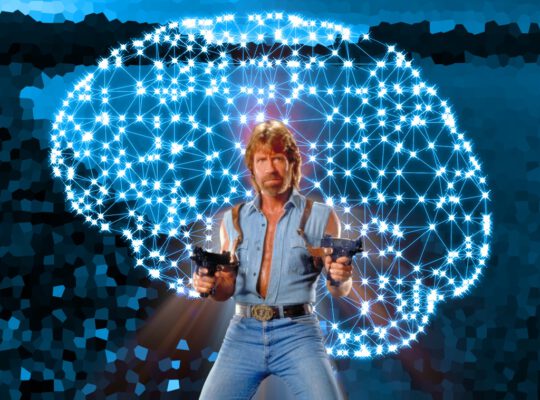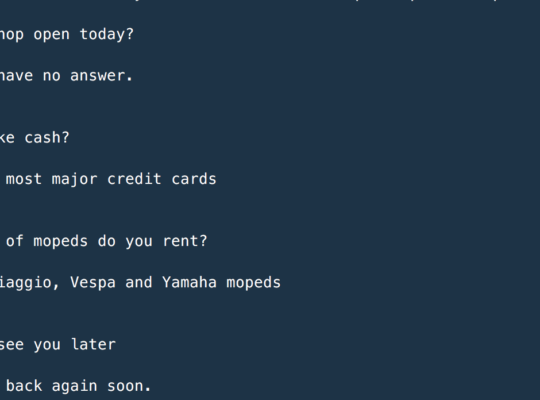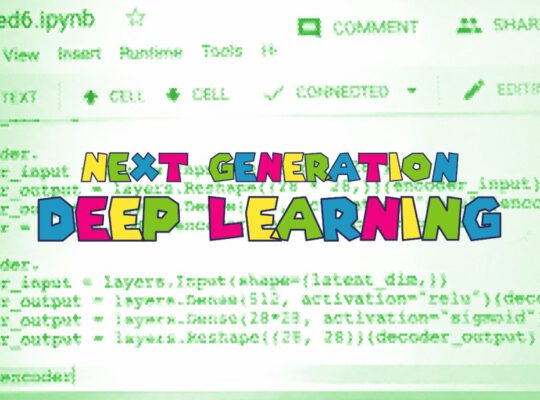Namaste! I wrote parts of this article in a tiny, little vegan café in beautiful Hamburg. I love that city! I got invited by iCompetence to attend the Digital Intelligence Conference 2018 as a speaker. I am very thankful for this opportunity to speak! My topic was Deep Learning in Germany. What an exciting topic! In the following you will get a rough summary of the things I had to say. Enjoy!
Extinction and/or Immortality.
Artificial Intelligence is a challenging field. It is a highly philosophical and polarizing one. That is why I personally try to avoid that term. Although it is something that is already changing mankind. You know, when it comes to predicting the future of homo sapiens, there is always two extremes. Extinction and immortality. The end of mankind or its evolution into „godhood“. I have a very personal opinion on that matter.
For me the extinction-extreme is a meme as many others. It is only partly James Cameron’s fault that it is so prominent. My belief is that this idea comes from a human fear of progress. A fear that many but not all people hold. Although human extinction by AI is perfectly possible, I think that it is also perfectly improbable.
The immortality-idea on the other hand is part of the Transhumanism movement. It is a very nice and delicate one. You know… Extending human lifespan. Augmenting human capabilities with technology. Fueling knowledge and creativity. The list of transhuman endeavours is a long one. I believe that this road has a very high probability. Why? I see it everyday. Just watch the news and you will see all those advances in that field.
Artificial Intelligence is a matter of huge interest. For many people and for many companies. This is true. It is also true, that this interest increased in the last couple of years. Although the term „Artificial Intelligence“ is roughly from around the 1940/50s. Today it is a trending topic or even a hype. You hear this very, very often nowadays. Even the German government mentions „Künstliche Intelligenz“ from time to time… But let me now talk about my super-special AI-topic: Deep Learning.
Deep Learning Democratization.
How come that Deep Learning is such a glowing tree of low hanging fruits? One word: Democratization. Everything just gets more and more available to more and more people on an everyday basis. The days are long gone where Artificial Neural Networks were things living in the dungeons of academia. Today it takes just 15 minutes to train your first Neural Network on your own computer.
Just fifteen minutes you ask? Yes, you are right. If I would buy a new MacBook Pro off the shelf right now, it would take exactly that time to get it development-ready and train a Neural Network on the MNIST-dataset. Installing the right software is a matter of some commands in the command-line. And the training would take 30 lines of code and 20 seconds of computation time.
If I would aim even higher – you know, Macs to not have proper GPUs for training – I could get an Amazon Web Services GPU-server in about 2 hours. Well… the last time I did this it took 1,5 hours for an activation-email to reach my inbox and 30 minutes for me to establish a Deep Learning pipeline. Up until recently, these endeavors took longer for devs or were even impossible. What is different now? Yes, again, everything is available. Hardware, software, data-sets, tutorials, papers, everything. Great times!
Use-Cases Galore.
I tend to say the following about the state-of-the-art of Deep Learning: Everyone that gets started with Neural Networks now, could be busy the next five years and will not run out of work. Not reinventing the wheel or doing ground-breaking work. Some of them will. But no. There is many already successful use-cases already around that just need to be mapped to your customer’s data. And people do not really know that yet!
Every time I finish reading a paper about a successful use-case facilitated by Deep Learning, two new ones suddenly appear. Deep Learning is like the Lernaean Hydra. Remember that creature from Greek mythology? You cut off one head and two new ones grow. Sometimes I feel like Hercules chopping my way metaphorically through the Deep Learning world!
The challenge is only to find the right tutorial or scientific paper and apply it. This is where the fun begins. Get some data. Do the preprocessing. Cleaning, balancing. And train your Neural Network on it. Repeat until your validation accuracy is high enough.
Clearing the house of rumors. Deep Learning in Germany is suffering from way too many untrue memes.
Ah yes… There is many rumors. Memes that prevail. Even the wrong ones. For example that you need a lot of working mathematical knowledge and experiences to train your Neural Networks… I do have a huge mathematical background. In my years of doing Deep Learning, math showed up mostly in the preprocessing phase. Normalizing data for example. Neural Networks have a lot of maths. Activation functions, losses, metrics in general, layers, optimizers. You name it. Well, truth be told… It took me around 1,5 years to reach a stage in which I had to implement my own layer and my own loss function. Trust me. You will not do that that often. Deep Learning is building blocks.
Remember Machine Learning Applications for Data Center Optimization? Optimizing Power Usage effectiveness with a Neural Network. When you read the paper you come to realize that the problem was solved with a five-layer fully-connected Neural Network. Exactly five layers. This is per definitionem „deep“, but not very deep. And each layer had 50 hidden units. This is basically nothing! This is a very simple Neural Network. Fully connected… this is the simplest type of layers. And the net dominated that use-case. In your endeavors, such a Neural Network will be one thing or the other: Either a very good baseline for further experiments or even your solution.
And true. Deep Learning is mainly a hyper-parameter optimization problem. Hyper-parameters are those tiny little variables of your learning problem that facilitate training. Things like numbers of epochs, batch size, optimizers, activation functions, and even the network architecture. There must be a lot of alchemy involved, you think? And a lot of best-practices? In my world it is not even a dozen of best-practices that get you started with solving your challenges.
What do you know, Deutschland?
But where is Germany, when it comes to Deep Learning? The truth is simple: There is still hope. More than that, to tell the truth! The same way I hope and expect for AI to bring us „immortality“, I hope and expect that Germany will create more and more Deep Learning experts. But there is still way to go…
What are the challenges? I did not mention Fachkräftemangel (skilled worker shortage) IT to be one of them. That is a dead horse. The poor creature has already taken a heavy beating, when I was a teenager. And it never stopped. For me, the problem is more like a lack of courage and an abundance of rigid processes.
Germany is great. Germans all work hard. They are always on time. They like to work a lot. Arbeit fertig, gut gemacht! But Germans also tend to do some over-planning. They are really good at creating steering committees. They then thinktank and create a very detailed process. This process then goes into a very fancy Powerpoint presentation. And those slides usually end up in some file-share. This really takes some time. For those consultants reading this: Of course, what I have mentioned here is good and righteous work. No sarcasm and no doubt about that. But there are more important things to do right now. Like creating prototypes!
And I also believe that there is some lack of courage. Germans often tend to wait. They wait until someone else shows that something works really great before incorporating it themselves. The trouble with that is that you have to recognize when someone already did something. When it comes to Germany, I really have the feeling that most people still wait for AI to prove itself to be a great thing. But it already did! Especially in Deep Learning, there are so many successful use-cases that I could already fill a huge book about them.
„Conclusio“ is Latin for „conclusion“.
We are on a good way. Deep Learning in Germany is on a good way. No one is going to go extinct like in James Cameron’s great movie. And Germany is going to overcome its challenges. This includes but is not limited to rigid processes and lack of courage. What is my part in that? Right. Teaching people the beauty of Artificial Intelligence. Theory and practice. That is what I do.
Stay in touch.
I hope you liked the article. Why not stay in touch? You will find me at LinkedIn, XING and Facebook. Please add me if you like and feel free to like, comment and share my humble contributions to the world of AI. Thank you!
If you want to become a part of my mission of spreading Artificial Intelligence globally, feel free to become one of my Patrons. Become a Patron!
A quick about me. I am a computer scientist with a love for art, music and yoga. I am a Artificial Intelligence expert with a focus on Deep Learning. As a freelancer I offer training, mentoring and prototyping. If you are interested in working with me, let me know. My email-address is tristan@ai-guru.de - I am looking forward to talking to you!







